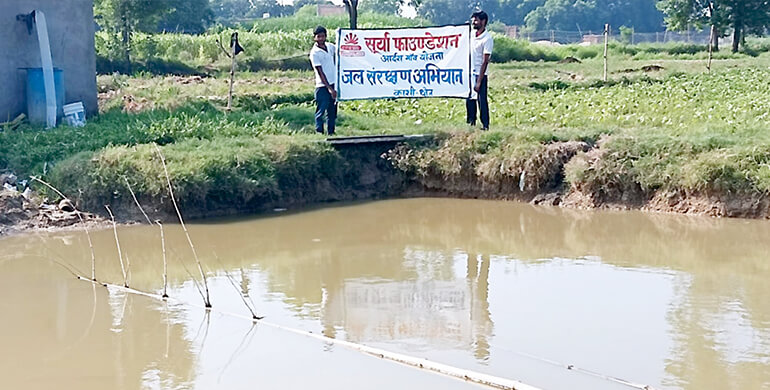
09 September, 2024
Environment
The significance of the environment in Indian philosophy has been recognized since ancient times. Elements of nature, such as rivers, trees, and the earth, have long been revered, symbolizing a deep respect for the natural world. Worshiping rivers as mothers, honoring the earth, and venerating trees like the peepal is not mere superstition. Rather, it reflects an effort to protect nature while expressing gratitude for its life-sustaining resources. For centuries, it has been understood that the well-being of humanity is intrinsically linked to the well-being of the environment.
Unfortunately, human activity has led to the widespread exploitation of natural resources, resulting in severe environmental damage on a global scale. There is no doubt that global warming is predominantly driven by human actions. The Paris Agreement on climate change, ratified by 171 countries, aims to address this issue, yet experts predict that, if current trends continue, the Earth's temperature could rise by 4°C by the end of the 21st century. This alarming increase in temperature is expected to reduce crop yields significantly, with some grains potentially seeing a 50% decrease in production, leading to inflation, food shortages, and hunger.
Deforestation and population growth are primary contributors to this environmental imbalance. While the world's arable land is shrinking, the pressure to produce more food has increased, resulting in the excessive use of chemical fertilizers. According to the United Nations, over one billion people globally still lack access to clean drinking water, and this number is likely to rise, leading to displacement and conflict over resources.
Rising sea temperatures, the shrinking of Antarctica’s glaciers, and the melting of Himalayan ice caps are further evidence of climate change. Irregular weather patterns are causing floods in some regions and droughts in others. The depletion of the ozone layer due to excessive greenhouse gas emissions has increased the amount of harmful ultraviolet radiation reaching the Earth, contributing to higher rates of skin cancer and cataracts. Furthermore, warmer temperatures create environments that foster disease-causing organisms, increasing the risk of infections.
The World Health Organization has warned that wheat production in India may drop by 50% by 2050. The Intergovernmental Panel on Climate Change (IPCC) forecasts that by 2080, over 1.1 billion people could face food shortages. These dire consequences are the result of over-reliance on fossil fuels, deforestation, and the degradation of the ozone layer.
Biodiversity is also under threat, with many species of plants and animals facing extinction. The decline in pollinators like bees has reduced the rate of plant reproduction, negatively impacting ecosystems. As humans continue to exploit natural resources, they are also creating future crises for themselves.
Amidst these challenges, there are efforts to restore balance. The Surya Foundation, a social organization led by Padmashree Jaiprakash Agarwal, Chairman of the Surya Group, has been dedicated to environmental conservation for over three decades. The Foundation has made significant strides in tree plantation efforts since 2017, mobilizing volunteers and communities across India. They have planted an impressive 36.4 million trees from 2017 to 2023 and are actively working in 457 locations this year. Their goal is to plant an additional 95,000 trees in 2023, with a focus on public awareness and community involvement.
By promoting tree planting, the Foundation aims to mitigate the effects of climate change, reduce carbon dioxide and methane levels, and restore ecological balance. Trees help lower global temperatures, prevent soil erosion, and stabilize weather patterns.
Water scarcity is another pressing issue. In regions like Punjab and Haryana, groundwater levels have dropped drastically, posing a significant threat to agriculture and daily life. Although India’s groundwater supply is limited, it remains heavily relied upon, particularly for irrigation. To address this, the Surya Foundation has launched a campaign to restore and beautify village ponds, which helps replenish groundwater. To date, they have deepened or reconstructed 189 ponds and implemented water harvesting projects at 96 locations. Their efforts include building anicut dams, reservoirs, and embankments to capture rainwater, and promoting rooftop water collection.
Public awareness remains crucial to water conservation efforts. The Foundation has engaged communities through rallies, seminars, and events, particularly focusing on educating the youth about the importance of saving water.
The environmental damage caused by plastic, particularly single-use plastic, is another area of concern. Plastic pollution extends from the Earth's surface to the ocean depths. The Surya Foundation has initiated awareness and training programs on reusing single-use plastic. They have successfully repurposed over 5,000 kg of plastic to create tree guards, chairs, stools, and tables. These efforts demonstrate a practical approach to reducing plastic waste while engaging the community in sustainability initiatives.
The Surya Foundation’s efforts serve as a reminder that collective action can lead to meaningful change. By working together, society can mitigate environmental degradation and build a more sustainable future. Protecting the environment is not just an ethical responsibility; it is essential for the survival and well-being of future generations. As we nurture and preserve nature, we ensure a healthier and more prosperous life for ourselves and those who come after us.
